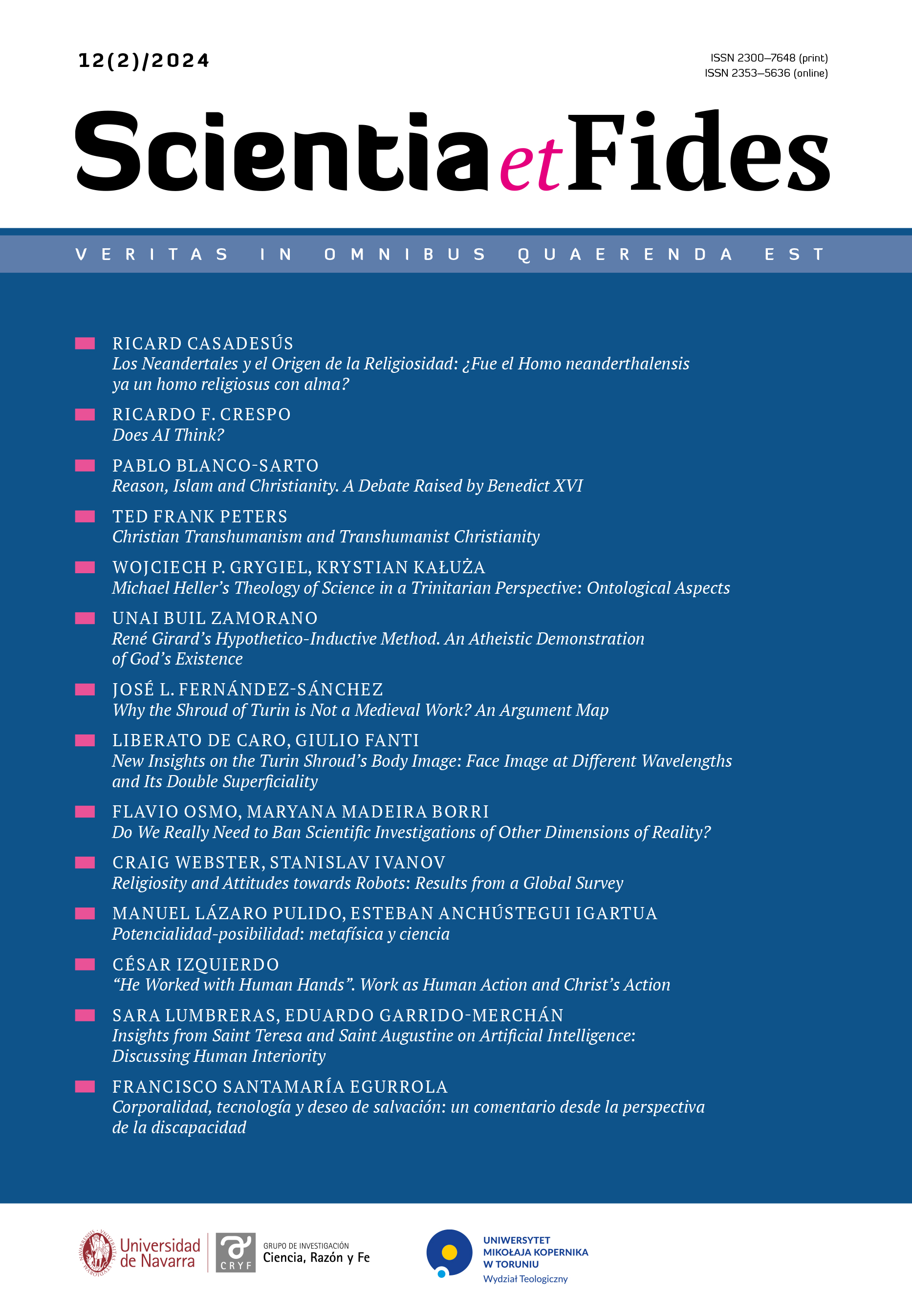Does AI Think?
DOI:
https://doi.org/10.12775/SetF.2024.014Keywords
Aristotle on Knowledge, Modern and contemporary visions of knowledge, Philosophers expert on AI notion of knowledgeAbstract
This article raises a very relevant question today: “Does AI think?” To come up with an answer, it explores several conceptions of knowledge, from classical Aristotelian notions to modern philosophers’ takes on it. For Aristotle, knowledge starts with the senses, and, through epagoge and nous, it grows into an understanding of the nature of the thing known, which is something that does not happen with AI. Modern schools of thoughts are either rationalist or empiricist. For rationalists, knowledge is innate, while empiricists believe all knowledge comes from the senses. As Kant views it, knowledge is “built” on sensorial data with the use of theoretical reason categories. Based on these approaches, it is harder to claim that AI does not think by itself. The article also reviews current philosophers’ views on AI and AI thinking. Summing up, the answer to the initial question depends on the concept of knowledge adopted. As this article shares the classical notion of thinking, it concludes that AI does not think.
References
Barnes, Jonathan. 1993. Aristotle Posterior Analytics, translated with a commentary by Jonathan Barnes. Oxford: Clarendon.
Blum, Paul Richard. 2010. “Michael Polanyi: Can the Mind be Represented by a Machine? Documents of the Discussion in 1949.” Polanyiana 201(1–2): 35–60.
Boden, Margaret. 2016. AI, its nature and future, Oxford: Oxford University Press.
Bunge, Mario. [1956] 1959. “Do Computers Think?” British Journal of the Philosophy of Science 7(26): 139–48, reprinted in Mario Bunge (1959) Metascientific Queries, 124–152, Springfield, Ill.: Charles C. Thomas.
Dreyfus, Hubert L. and Stuart E. 1986. Mind over Machine. The Power of Human Intuition and Expertise in the Era of Computer. New York: The Free Press.
Gilson, E. and T. Langan. 1963. A History of Philosophy, 3, Modern Philosophy. Descartes to Kant. New York: Random House.
Hintikka, Jaakko. 1980. “Aristotelian Induction.” Revue Internationale de Philosophie 34(133–134): 422–39.
Hintikka, Jaakko. 1992. “The concept of induction in the light of the interrogative approach to inquiry.” In J. Earman (ed.) Inference, explanation, and other frustrations: Essays in the philosophy of science. Berkeley, CA: University of California Press.
Hintikka, Jaakko. 2004. Analyses of Aristotle. Selected Papers 6. Hingham: Kluwer.
Jaki, Stanley L. 1969. Brain, Mind and Computers. New York: Herder and Herder.
Kant, Immanuel. [1787] 1999. Critique of Pure Reason, Translated and Edited by Paul Guyer and Allen Wood. Cambridge: Cambridge University Press.
Kenny, Anthony. 2006. The Rise of Modern Philosophy. Oxford: Clarendon Press.
Kenny, Anthony. 2007. Philosophy in the Modern World. Oxford: Clarendon Press.
Kohne, Jens. 2014. “Ontology, its Origins and its Meaning in Information Science.” In Philosophy, Computing and Information science, edited by Ruth Hagengruber, and Uwe Riss, 85–90. London: Pickering and Chatto. DOI: https://doi.org/10.4324/9781315653938
Landgrebe, Jobst and Barry Smith. 2023. Why Machines Will Never Rule the World. New York and London: Routledge.
Legg, Shane and Marcus Hutter. 2007. “A Collection of Definitions of Intelligence”, IDSIA-07-07 Technical Report. https://arxiv.org/abs/0706.3639, Accessed 22 February 2024.
McLear, C. 2020. “Kantian Conceptualism/Nonconceptualism.” In The Stanford Encyclopedia of Philosophy (Fall 2021 Edition), edited by Edward N. Zalta. https://plato.stanford.edu/archives/fall2021/entries/kant-conceptualism/.
Oberst, Michael. 2015. “Kant on Universals.” History of Philosophy Quarterly 32(4): 335–52.
Polanyi, Michael. 1952. “The Hypothesis of Cybernetics.” The British Journal for the Philosophy of Science 2(8): 312–315. https://www.journals.uchicago.edu/doi/10.1093/bjps/II.8.312.
Reeve, C.D.C. 2006. “Aristotle on the Virtues of Thought.” In The Blackwell Guide to Aristotle’s Nicomachean Ethics, edited by Richard Kraut, 199–217, Oxford: Oxford University Press.
Reeve, C.D.C. 1995. Practices of Reason. Aristotle’s Nicomachean Ethics. Oxford: Clarendon Press.
Sanchez Cañizares, J. 2022. “Posibilidades y límites de la inteligencia artificial.” Toledana 46(1): 233–50.
Turing, Alan M. 1950. “Computing Machinery and Intelligence”, Mind NS 59(236): 433–60. http://dx.doi.org/10.1093/mind/LIX.236.433.
Downloads
Published
How to Cite
Issue
Section
License
Copyright (c) 2024 Ricardo Crespo

This work is licensed under a Creative Commons Attribution-NoDerivatives 4.0 International License.
CC BY ND 4.0. The Creator/Contributor is the Licensor, who grants the Licensee a non-exclusive license to use the Work on the fields indicated in the License Agreement.
- The Licensor grants the Licensee a non-exclusive license to use the Work/related rights item specified in § 1 within the following fields: a) recording of Work/related rights item; b) reproduction (multiplication) of Work/related rights item in print and digital technology (e-book, audiobook); c) placing the copies of the multiplied Work/related rights item on the market; d) entering the Work/related rights item to computer memory; e) distribution of the work in electronic version in the open access form on the basis of Creative Commons license (CC BY-ND 3.0) via the digital platform of the Nicolaus Copernicus University Press and file repository of the Nicolaus Copernicus University.
- Usage of the recorded Work by the Licensee within the above fields is not restricted by time, numbers or territory.
- The Licensor grants the license for the Work/related rights item to the Licensee free of charge and for an unspecified period of time.
FULL TEXT License Agreement
Stats
Number of views and downloads: 727
Number of citations: 0



